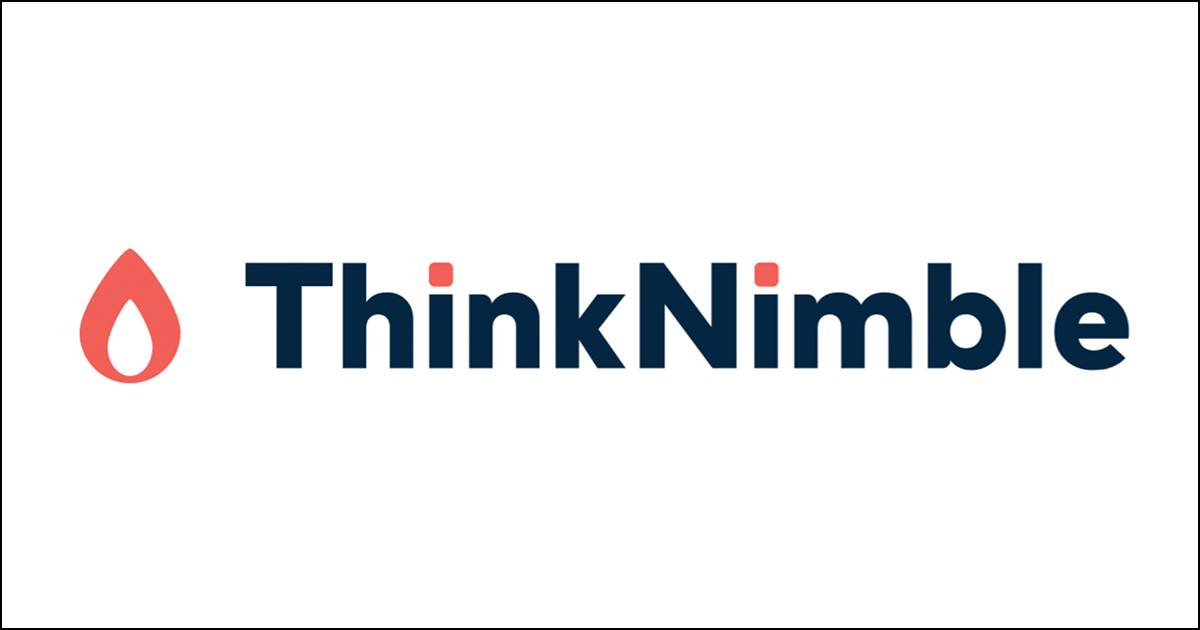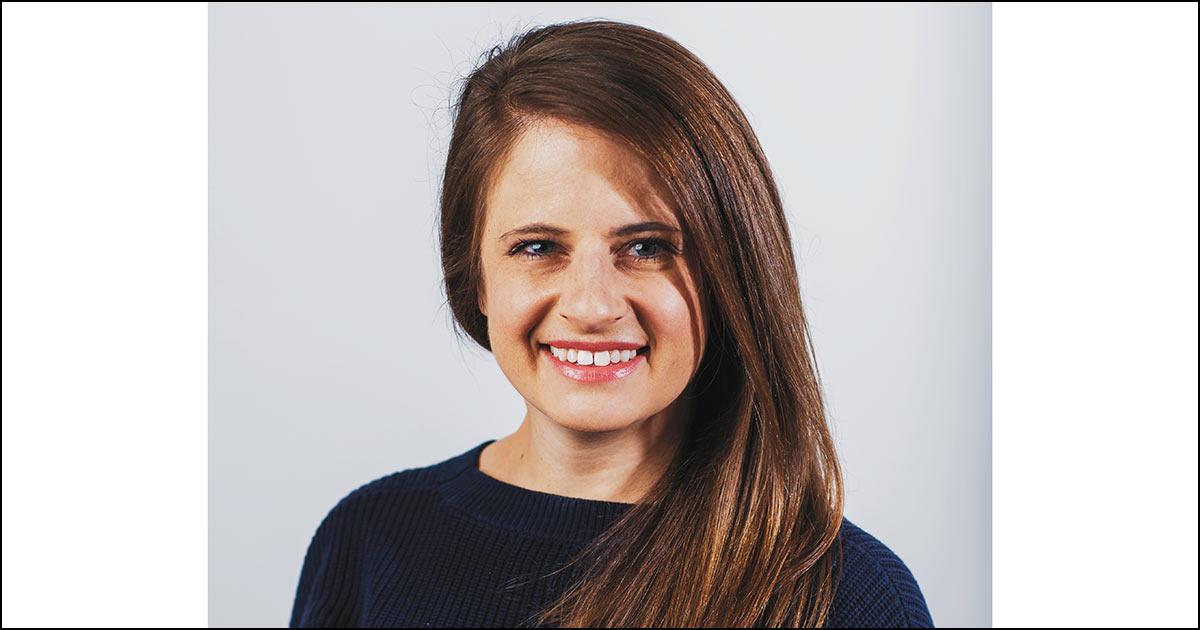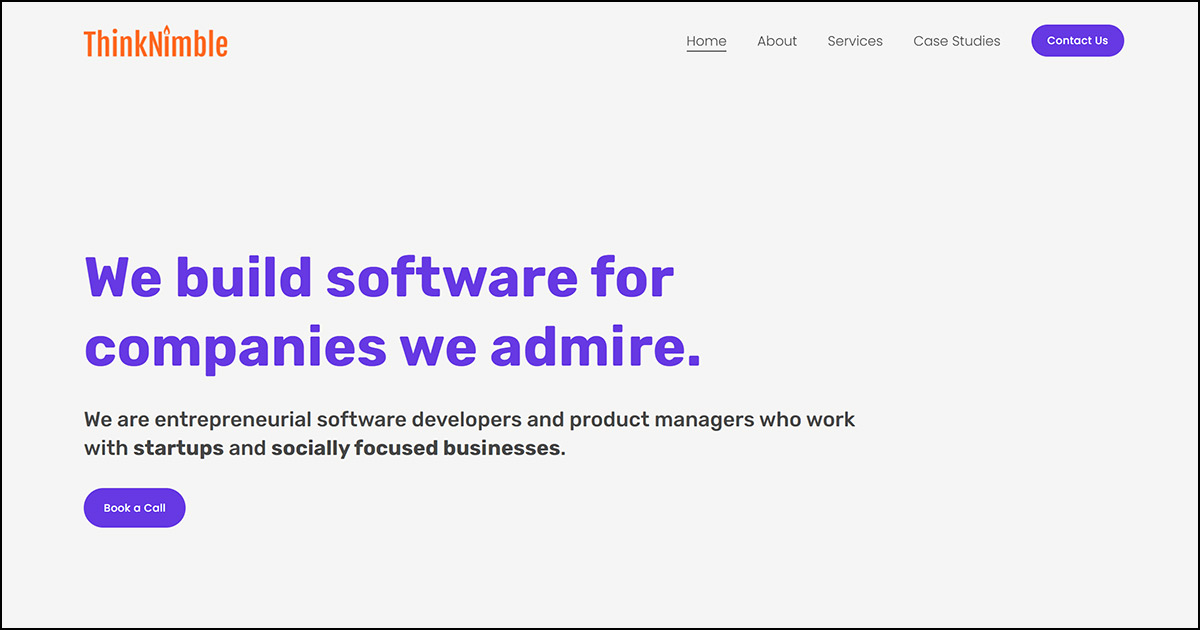ThinkNimble Profile

Last Updated: By TRUiC Team
ThinkNimble is a B2B software company that provides innovative software solutions for startups and socially-focused companies, especially those with non-technical founders.
Interview With Marcy Ewald
Describe your product or service:
“ThinkNimble serves as your CTO to establish a product process within startups and socially-focused businesses.”
Describe your company values and mission:
“The mission of ThinkNimble is to equip positive change agents in our community to make a larger impact through technology. Our values are excellent outcomes, empowerment, service, creativity, and joy.”
How are you funded? I.e. venture capital, angel investors, etc.
“Self-funded.”
How big is your team? Tell us a little about them (I.e. co-founders, freelancers, etc.)
“Three co-founders, 19 full-time, [and] 10 contractors.”
Did you always want to start your own business? What made you want to become an entrepreneur?
“I did — I wanted to have control over my day-to-day, and I love that ultimately I choose my schedule and the direction of my company.”
How did you come up with your startup idea? How did you decide to actually act on the idea? What gave you confidence that you were on the right track?
“We were actually able to incubate our agency idea at the company that bought our last startup. It's rare at a startup that you have paying customers from day one. It felt so real and people actually wanted what we had to offer. That gave us the confidence to keep going.”
How did you come up with your company name? Did you have other names you considered?
“We made a google doc with 100 names we'd be happy with. We ended up with Nimble (synonym of Agile), but it was taken by a company in Australia. Knowing we'd be directly competing in Australia in 14 years, we added ‘Think.’ The URL was already taken, so my co-founder offered to fly to Canada to take the guy to dinner to get it. The guy said no and sold it to us. I was appalled at the price, but it was worth it.”
Feeling inspired? Learn how to launch your company with our guide on how to start a startup.
What is the greatest challenge you faced in starting your business, and how did you overcome it?
“We are in a very crowded space without a lot of differentiation. It is a highly valuable asset to be able to produce code and to create something from nothing, but there are also a lot of really talented individuals entering that market every day. The key thing that we had to figure out was what type of people produce the best applications and how can we find, attract, and retain that type of talent? So we started off with a contractors-only business where we outsourced a lot of our code, and we found that that led to reduced quality in terms of longevity of our clients. So we spent a lot of time building up in-house talent, starting with junior engineers and then finally moving to senior product engineers.
I think our key learning was that the driver of the product process has an outsized impact on whether or not the product is successful, regardless of the type of code that goes into it. So we really started focusing in on the type of people who can see a business idea and translate that into application features. The validation and verification that certain features tied to business outcomes was a very key learning for us as we started, and it allowed us to differentiate from the market.”
Who is your product or service made for? Who is your target market?
“Our service is made for 1) non-technical founders who want to not only build a product but establish a product development process within their company, 2) enterprise clients who have an in-house team but need additional support to innovate on special projects that their in-house team can't handle, and 3) companies that are looking to make the world a better place. Ultimately tech makes things go faster and farther, and we want to help good ideas and great causes do just that.”
What's your marketing strategy?
“Our marketing is all about creating this sense of community around the loneliness of entrepreneurship — to know that when you're the person who is talking to the 99th potential user and [who has] gotten 98 no's, someone gets what that feels like. They're there for you. They'll help make you better. They'll make you feel like your idea is important. Then, when the idea starts working, they have the resources to pour gas on the fire and help you grow.”
How did you acquire your first 100 customers?
“We didn't. In our case, 10 customers is more relevant. People had such terrible expectations for outsourced firms, and we put our hearts and souls into making them feel like they had a team. Entrepreneurship is lonely. Our first 10 customers felt like someone heard and lived their crazy experience.”
What are the key customer metrics / unit economics / KPIs you pay attention to to monitor the health of your business?
“Charles Fred, who runs a company called TrueSpace, has this philosophy that the key way to go from a million-dollar business to a $10 million business is to find the single metric that if you improve that one metric, it improves the health of your business overall. We're still on the hunt for that one knob that we can turn to really scale our business. In the meantime, some of the things that we know are important are cost to revenue ratio, key iterations per client, ratio of contractors to full-time employees, billing rates, and ratio of overhead to key functional people.”
What's your favorite book on entrepreneurship?
“‘Dare to Lead’ by Brene Brown. I think that entrepreneurship is typically thought of as a great idea that comes to life, but really, entrepreneurship is getting the right people in the right seats to help your idea have feet and legs. Learning how to be a leader who has as much attachment to your people's humanity as you do to their output, I think, gives you the opportunity to scale beyond where an idea could take you.”
What is your favorite startup or business podcast?
“There's something really interesting about podcasts that take disparate ideas and help you see connections to your business industry. I think that one of the key ways to stay really active as a leader is to be able to bring in different perspectives from outside your industry and apply them to your business case because I think it moves your industry forward faster.
The place I get my best ideas is actually from unrelated, science-driven podcasts that I personally find interesting. Then I can apply those learnings to either a leadership technique or something specific in our business. I think that can be more powerful than some of the truisms that come out of typical business podcasts.”
What is something that surprised you about entrepreneurship?
“I love this question. I think we think of entrepreneurship often in the collective mindset as that beginning piece, which is coming up with an idea and then actually working on the idea. And the difference between being a business leader and being an entrepreneur is being able to look at and create systems. I didn't know how much of my time would go into figuring out how to document and manage outcomes.
What I love about systems is that it gives you the ability to scale beyond the time that you have in a day. When I initially thought of entrepreneurship, I thought, oh my gosh, I would have this great idea. And then, every day, I'm going to work on that idea. Instead, you hit the maximum of your capacity, and you have to figure out how your idea can exist outside of you, and that is an entirely different set of skills that is required to inspire others to move in the same direction as you do.”
How do you achieve work/life balance as a founder?
“I personally work four 10 hour days. Giving myself fewer days to think about work was the only way to limit the amount of work that I would do. I am personally motivated by work, and I find deep value in putting time into work, but I know if I derive all my value from my work output, that will get me to an unhealthy place. To combat that, I've forced myself to set aside time to do things outside of work. That gives me the best chance to carve out space that does not get dedicated to other people's priorities, but rather to mine.”
How do you stay motivated?
“Motivation is such an interesting thing. What does it really entail? For me, the more important metric is the discipline that you've set in place that sets the floor for your motivational success. James Clear has this quote, ‘You don't rise to the level of your goals; you fall to the level of your systems.’ For me, motivation is a fleeting opportunity. Sometimes you're motivated, sometimes you're not. But when you habitualize your days, you don't have to find it in yourself to come to work to do the same thing or keep growing.
Motivation is there or it's not, and it's dependent on a lot of outside factors, but your ability to consistently perform regardless of that motivation comes back to what habits and practices you have in place that don't require your brainpower. And then, the motivation is a lot easier to find because your brain space is freed up to think about things that are inspiring to you. And when you're inspired, you're more likely to come motivated to work.”
Did you have to develop any habits that helped lead you to success? If so, what are they?
“Ritualizing meetings is really important and establishing accountability, so you can depend on a certain thing happening. For example, we have a leadership meeting every week, and in that leadership meeting, we follow the same agenda. The habit of that gives the space to address small things consistently before they become big things. And if you only did them sporadically, the magic of the meeting is lost.
Another thing I have always prioritized is physical movement. I think my brain works better when it's not thinking specifically about a problem. I used to run, and that was where ideas came to me. Now I do a lot of cooking, and by giving space for my brain to be somewhat engaged in another activity, it gives liberty to other random ideas to be percolating behind the scenes.”
What are you most proud of as an entrepreneur?
“I'm so proud of the people that we are able to attract to this company. I don't have a clear picture about why we get amazing humans in the door, but we consistently find these people with hearts of gold who are also inspired by what we're inspired by. That is a magic that I didn't intentionally make, but I'm so proud that I get to be a part of.”
Recommended:
- Keep up with more startup companies by visiting our list of the top startups to watch.
- Hear startup stories from real founders on the Startup Savants podcast.
- Form your own startup by reading our review of the best online incorporation services.
Tell Us Your Startup Story
Are you a startup founder and want to share your entrepreneurial journey withh our readers? Click below to contact us today!
More on ThinkNimble

Insights From the Founder of Software Startup ThinkNimble
We were fortunate enough to hear some valuable insights during our interview with Marcy Ewald of ThinkNimble that will inspire, motivate, and teach aspiring and established entrepreneurs alike.

3 Ways to Support Software Startup ThinkNimble
We asked Marcy Ewald, founder of ThinkNimble, to share the most impactful ways to support their startup, and this is what they had to say.


